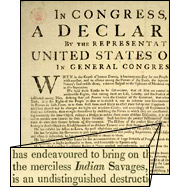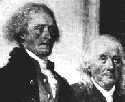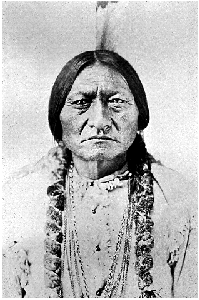
 From the LA Times Magazine, 8/13/00:
From the LA Times Magazine, 8/13/00:

 From the LA Times Magazine, 8/13/00:
From the LA Times Magazine, 8/13/00:
Democracy Rocks!
By John Balzar
Hungry, cold, cut off from supplies, fearful of attack, worried sick about the futureójust what were the nation's first homesteaders to do? Why, politics for starters. Colonizing America, the settlers of Jamestown began the future with what we now regard as the most ordinary step. At the time they could have been accused of radicalism. They chose a leader. There would be no hereditary royalty, as in the land they fled. No hereditary chief, as in this new continent. From among themselves they elected a president. The president's name is all but forgotten: Edward Maria Wingfield.
By autumn of that year, 1607, anxiety overcame the Virginia colonists, and they pink-slipped Wingfield in favor of John Ratcliffe, who was saddled with crisis graver than any president since. During that winter, 73 of the 105 original settlers perished from illness, exposure and starvation.
Survivors assembled and quarreled again about who would lead them. Habits, you see, were being formed. By majority vote, they turned to the adventuresome, self-promoting John Smith. He was elected president of the Jamestown Council on Sept. 10, 1608. Smith's discipline held them together until they were resupplied and reinforced. Then wouldn't you know. With improving conditions, colonist began to chafe under the imperious Smith. He lost a power struggle and was ousted after less than 13 months in office.
So it has been ever since: restless Americans in search of the right leader for the moment.
Rob's reply
In response to this essay I wrote the following letter, which the LAT Magazine published (in edited form), 9/10/00:
John Balzar glossed over a few realities in his paean to American democracy. For starters, the thousands of pre-Columbian Indian tribes probably had every form of leadership known to man, not merely "hereditary chiefs." The Founders based the US government partly on the model of the Iroquois League, which Benjamin Franklin touted highly.
Whatever their form of government, Indians were arguably more free than their contemporaries in Europe. As Jack Weatherford writes in his book Indian Givers:

The most consistent theme in the descriptions penned about the New World was amazement at the Indians' personal liberty, in particular their freedom from rulers and from social classes based on ownership of property. For the first time the French and the British became aware of the possibility of living in social harmony and prosperity without the rule of a king.
Also, Jamestown didn't survive because of John Smith's proto-American traits such as discipline or a can-do attitude. It survived because of Pocahontas's help. As Smith himself wrote, "[Pocahontas] was...the instrument to prusurve this colonie from death, famine, and utter confusion." Besides guiding the colonists to food or vice versa, she also famously saved Smith's life.
Finally, the new president Ratcliffe didn't just oust Smith after a power struggle, he condemned Smith to death. The noose was around Smith's neck before cannon fire from a newly arrived ship stayed the execution. So much for democracy in action, eh?
Isn't our history impressive enough without these vain attempts to glorify it (and ourselves)? Balzar looks a bit desperate when he tries to credit John Smith, an English mercenary born almost 200 years before the Declaration of Independence, with being an American patriot. Let's skip the myths and stick to the facts, please.
Addendum: The typical Indian chief was chosen by consensusóthe same as any group leader who earns a position informally. Relatively few chiefs got their position through nepotism. In contrast, absolute monarchs ruled every European country in 1607. The American colonists were the first Europeans to stop bowing to a "hereditary chief" some 169 years later.
Related links
Pocahontas bastardizes real people
Ten little Pilgrims and Indians
Fun 4th of July facts
Indians gave us enlightenment
The myth of American self-reliance
Readers respond
"I hate to say it, but I think you got some facts confused regarding John Smith."
|
. . . |

|
All material © copyright its original owners, except where noted.
Original text and pictures © copyright 2007 by Robert Schmidt.
Copyrighted material is posted under the Fair Use provision of the Copyright Act,
which allows copying for nonprofit educational uses including criticism and commentary.
Comments sent to the publisher become the property of Blue Corn Comics
and may be used in other postings without permission.